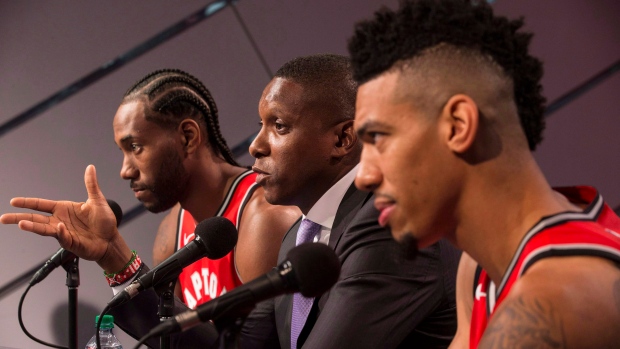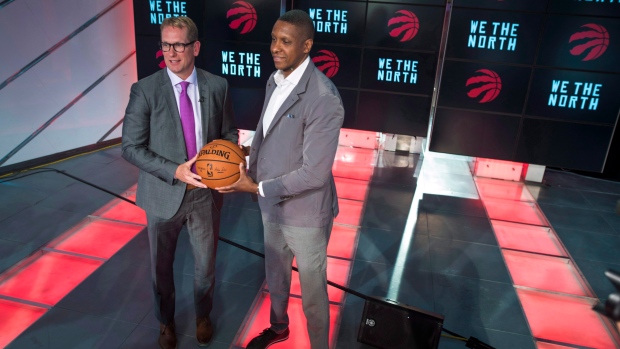May 31, 2019
The Raptors' 'change agent': What leaders can learn from Masai Ujiri
, BNN Bloomberg
Raptors' co-founder on Kawhi Leonard, Drake and another Canadian NBA team
#InMasaiWeTrust has become a rallying cry on social media now that the Toronto Raptors have made history advancing to the NBA finals for the first time.
But it wasn’t always that way.
Last summer Raptors President and General Manager Masai Ujiri shocked the league and fans, firing head coach Dwayne Casey and shipping franchise icon DeMar DeRozan to the San Antonio Spurs for then-injured star Kawhi Leonard. The gutsy trade of DeRozan – the first Raptors star who voiced his wish to stay with Canada’s team – was met with fury by many fans, with some even comparing Ujiri to a snake.
“It had to be one of the toughest decisions he’s probably ever had to make in his career. But after just watching the same thing happen each and every year in the post-season, if you didn’t take drastic actions, nothing was ever going to change,” said Kate Beirness, Raptors reporter for TSN, in a phone interview.
“I think being bold can certainly pay off, and at the end of the day, sports are a business. To succeed in this business is to win championships … I think he’s proven to be one of the greatest leaders that the Raptors have ever had.”

Given how Ujiri’s big gambles have unfolded into the Raptors’ most successful season in their 24-year history, some experts say the NBA executive’s bold risk-taking and leadership style offer important lessons for leaders and CEOs even outside the world of sports.
The 48-year-old Nigerian-born executive has worked his way up the NBA, previously serving as a Raptors assistant general manager before heading to the Denver Nuggets to lead the franchise to a team-record 57 wins in the 2012-13 season.
In June 2013, Ujiri was tapped as the Raptors’ fifth general manager and has since disrupted the organization in a sweeping culture reset, focused on winning at all costs.
“These big plays and bold moves say that Ujiri is a talent magnet for the best; stars who want to be the best they can be under a boss who believes in their ultimate potential,” said Bob Pickard, principal of Signal Leadership Communication Inc., in an email interview.
- From tickets to hot dogs: How the cost of Raptors fandom has soared
- I always knew Toronto could be an 'NBA city': Raptors' co-founder
- Pascal Siakam has 32 points in Raptors' historic NBA Finals win over Warriors
MORE ON THE TORONTO RAPTORS
“Ujiri joined the Raptors as a change agent and … his leadership has created a compelling rallying point for winning.”
Beirness adds that the most important takeaway from Ujiri’s bold style is that leaders need to have the courage to focus on a long-term vision, even if risks come at the expense of others.
“I don’t think there’s any scenario where you’ve gotten to the highest point without making tough decisions and hurting people’s feelings,” Beirness said.
“He knew what he saw and what could be. And to have a vision, make bold moves and unfortunately hurt some people along the way, completely paid off. So I think the biggest thing is just to take the risk. I think that’s what everyone can learn from Masai.”

Ujiri has previously said that communication is a huge part of the Raptors’ organization – and that positive attitude toward public relations is another attribute that Pickard says other CEOs should take note of.
“All too often, when CEOs communicate, they keep what they think is a safe distance from others, using canned cliches or mealy-mouthed messaging. Ujiri is super-effective because he is emotionally engaging and explains not just what he is thinking, but also what he is feeling,” Pickard said.
“He doesn’t spout B.S. or make excuses — he candidly tells it like it is with a refreshing humility while treating everyone with conspicuous respect.”
Still, while winning and risk-taking may be Ujiri’s defining legacy, a more understated measure of managerial success is how well he’s been able to convince others to follow them.
“For the most part, people are risk averse,” said Geoffrey Leonardelli, professor at University of Toronto’s Rotman School of Management and department of psychology, in a phone interview.

“That Masai Ujiri was able to bring the organization along with him in effecting this change and taking this risk and seeing what the Raptors can do, is an incredible sign in and of itself.
“Even if the payoff doesn’t come to be … Getting people to come along with you is part of the challenge, arguably the first step.”
But in contrast to succeeding in business, winning a championship in sports has a small window of opportunity that Ujiri knew he could seize on with the right mix of players.
“Kyle [Lowry] is 33 years old, and when you have a shot like that [to win a championship], you have to buy in because there’s no other way,” Beirness said.
“You’re talking about being at the top of 32 teams and the probability of that happening is very, very low. I think [Ujiri] just knowing this team so well and knowing their mentality that this might be it – he knew they would be 100 per cent in.”






